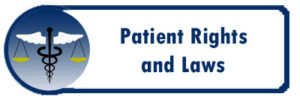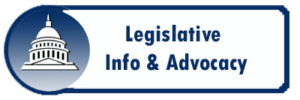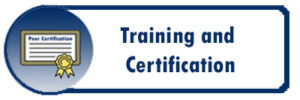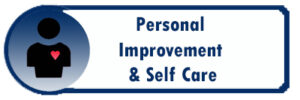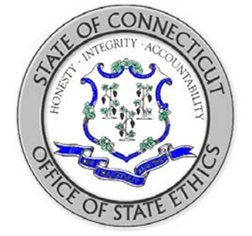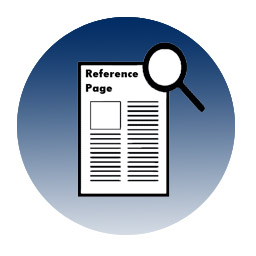
This reference section contains information that a person working as a peer supporter or advocate may find helpful. There are topics such as the ethical standards of peers, HIPAA compliance, and the core competencies of peer workers. We have material that can both promote the use of peer support and show the value of peers in testimony or presentations. Lastly there is a dictionary for standard terms, abbreviations, and language changes we as people in recovery wish to see.
General Reference
Summary of the HIPAA Security Rule
Direct link to the U.S. Department of Health & Human Services website for information related to HIPAA.
HIPAA Compliance Checklist
Our HIPAA compliance checklist has been divided into segments for each of the applicable rules. It should be pointed out that there is no hierarchy in HIPAA regulations, and even though privacy and security measures are referred to as “addressable”, this does not mean they are optional. Each of the criteria in our HIPAA compliance checklist has to be adhered to if your organization is to achieve full HIPAA compliance.
What Are Peer Recovery Support Services?
This manual explains peer recovery support services designed and delivered by people in recovery from substance use disorders. It discusses types of peer support for recovery, the adaptability and value of peer recovery support services, and cross-cutting core principles.
Core Competencies for Peer Workers
Learn about the foundation and essential core competencies required by a range of peer workers within behavioral health services.
Integrating Peer-support Services
Review recommendations for integrating peer support services into healthcare systems as promoted by the Affordable Care Act.
Peer Support Recovery Is the Future of Behavioral Health
Learn how community organizations provide peer support services to people in recovery and the importance of peer specialists in the behavioral health field.
Value of Peers, 2017
This is a beautifully done presentation that was created by SAMHSA in 2017. It talks about what peer support is as well as how it can be applied in the modern mental health and addiction treatment setting. This is an amazing resource that can be used to educate anyone about the life changing roll a peer can play in the recovery process.
Code of Values, Ethics, and Principles
Certified Recovery Support Specialists’
DMHAS; Updated January 8, 2015 (revised December 11, 2019)

CODE OF VALUES & ETHICS
1. Certified Recovery Support Specialists will not practice, condone, facilitate, or collaborate in any form of discrimination on the basis of ethnicity, race, sex, sexual orientation, age, religion, national origin, marital status, political belief, mental or physical disability, or any other preference or personal characteristic, condition, or state.
2. Certified Recovery Support Specialists will advocate for the full participation and inclusion of individuals into the communities of their choice and will promote the inherent value of these individuals to those communities.
3. Certified Recovery Support Specialists will advocate for those that they serve to make their own decisions in all matters. Certified RSSs will advocate for individuals to achieve their own stated needs, wants, and goals.
4. Certified Recovery Support Specialists will, at all times, respect the dignity, privacy, confidentiality and rights of the people they serve.
5. Certified Recovery Support Specialists should avoid entering into dual intimate relationships or commitments that conflict with the interests of those they serve (while the working support relationship is ongoing).
6. Certified Recovery Support Specialists should not engage in sexual or intimate activities or relations with the people they serve.
7. Certified Recovery Support Specialists will openly share their recovery stories in order to promote and support recovery and resilience with the people they serve and colleagues (as appropriate to the situation).
8. Certified Recovery Support Specialists will keep current with emerging knowledge relevant to recovery peer support and advocacy, and openly share this knowledge with their colleagues and people they serve.
CERTIFIED RECOVERY SUPPORT SPECIALISTS’ PRINCIPLES
Certified Recovery Support Specialists are guided by the following principles in
conducting their various roles, relationships, and levels of responsibilities:
1. Hopeful
2. Self-determination
3. Strengths based
4. Recovery-oriented
5. Trauma-informed
6. Understanding the Human experience instead of pathologizing and treating people like a diagnosis
7. Respect
8. Non-assuming and Being Curious to learn from those they serve
9. Person centered/Person driven Recovery
10. Dignity of Risk
11. Mutuality and Shared Power
12. Advocacy
13. Self and relational care
14. Partnering
15. Open-minded – Non-Judgmental
16. Self-awareness
17. Shared decision making
18. Transparency with those served
19. Authenticity
20. Embracing and Supporting Diversity
21. Honesty
22. Empathy
Advocacy Unlimited’s Recovery Support Specialist Code of Conduct – All information related to the RSS code of conduct will be distributed in the course materials and discussed at length in the training classes It should be noted that AU’s code of ethics closely follows the current DMHAS code of ethics for Recovery Support Specialists with only minor differences in wording. If you would like specific information or have a question about the RSS program please contact Advocacy Unlimited directly.
Connecticut Certification Board, Inc. (CCB) CODES OF ETHICAL CONDUCT – The CCB is an independent, non-governmental, 501(c) 3 nonprofit organization that offers certification for addiction counselors, clinical supervisors, and prevention professionals in Connecticut. The Board has established specialty certificates in substance abuse, co-occurring disorders, and problem gambling for professionals licensed and credentialed in other behavioral healthcare domains.
Connecticut Certification Board, Inc. (CCB) – Code of Ethical Conduct for Addiction Counselors
Connecticut Certification Board, Inc. (CCB) – Code of Ethical Conduct for Peer Recovery Specialists
Connecticut Certification Board, Inc. (CCB) – Code of Ethical Conduct for Prevention Specialists
National Practice Guidelines for Peer Supporters – SAMHSA Working Definition of Recovery – 9 page PDF file – National Association of Peer Specialist (NAPS) embarked upon an inclusive process, with assistance from a panel convened by SAMHSA, to establish Practice Standards for the emerging profession of Peer Support, as a first step in a possible national credential.
Connecticut State Legislators Guide to the Code of Ethics – 16 page PDF file.
Public Officials and State Employees Guide to the Code of Ethics – 16 page PDF file.
State Contractors Guide to the Code of Ethics – 15 page PDF file.
Client Lobbyist Guide to the Code of Ethics – 38 page PDF file.
Citizen’s Guide: Filing an Ethics Complaint – 11 page PDF file.
Code of Ethics
These are the standards that will apply to any board member, staff member, employee, volunteer, or intern of Recovery Innovations for Pursuing Peer Leadership and Empowerment, Inc. (RIPPLE)
These ethical standards are to be followed along with any relevant agency, state and federal standards. RIPPLE’s code of ethics shall not supersede or replace and currently known and accepted codes governing certified peer ethics or professional guidelines. We have created our own to better reflect our core values and beliefs.
Personal Recovery:
- I will place my personal recovery first and ensure that self care is incorporated within my work.
- I will step away from the peer support role if necessary to maintain my mental or physical wellbeing.
- Knowing that a relapse or setback in my recovery is possible I will seek the help that I need should this occur. I will step away and regain my footing before attempting to serve others.
Recovery Story:
- I will share my lived experiences and story to help others.
- I will never disclose information I am uncomfortable sharing and keep myself safe in all interactions.
- I will never share another persons recovery story unless given express permission to do so.
Confidentiality:
- I respect the privacy of those I serve and I will follow confidentiality guidelines as required by both state and federal law.
Conduct:
- I will act in accordance with the law.
- I represent myself and my capabilities accurately.
- I will not knowingly practice, condone, facilitate, or collaborate in any form of discrimination whatsoever. This includes but not limited to: Age, Race, Ethnicity, Gender, Gender Identify, Sexual Orientation, Country of Origin, Personal Beliefs, Religion, Political Affiliations, Marital / Family Status, Mental / Physical Disability or Limitations, Criminal History, or any other preference or personal characteristic, condition, or state.
- I will do my best to support others, as a peer I know I have certification, not a cape. I must be aware that I can not help everyone. In the event there is no common ground or a conflict of a personal/professional nature does arise I will endeavor to find a suitable replacement to better serve the client as soon as possible.
- As a person with lived experience I will use both my personal knowledge and training to advocate to the best of my ability on the issues most important to the individuals I work with as well as my community at large.
Professional Development:
- I will improve my recovery service knowledge/skills through ongoing education and training.
Draft: September 3, 2022
Research Articles
Coming Soon
Coming Soon
How to Tell if Someone is Shooting Up This article, published by Arrow Passage Recovery is a good starting point if you have concerns about someone you know using IV drugs. Sections of this article includes an introduction, first signs, physical signs, other signs, other drugs that are injected, binges, health risks, and what to do.
It explains why someone might use IV drugs by answering the questions:
What Does Shooting Up Meth Feel Like?
How Does Injecting Heroin Feel?
This site also gives you access to informational videos:
Video: How to Help a Loved One Struggling With IV Use
Video: Signs of IV Drug Use
Language – Recovery Dictionary
Active Listening – A technique used in counseling whether between peer to peer or peer to another service provider. This technique is also used in any environment where It requires that the listener to concentrate, fully understand, and respond in a meaningful manner to what has been said.
Cultural Competence – As a peer, cultural competence is extremely important when helping others in the areas of mental illness or addiction. It refers to our ability to demonstrate acceptance toward a patient’s diverse values, system of beliefs, feelings, and life experiences they have dealt with over the years. We must accept them as they are, even if we do not fully understand what they hold to be true.
Lived Experience – Experience gained by people in recovery from a mental illness and/or substance use disorder. In a Peer Support role they will leverage this lived experience to assist others on their recovery journey. A Peer will use their experience to inspire, educate, and above all else, be a living example that recovery is indeed possible.
Peer Support Workers – as defined by SAMHSA – Peer support workers are people who have been successful in the recovery process who help others experiencing similar situations. Through shared understanding, respect, and mutual empowerment, peer support workers help people become and stay engaged in the recovery process and reduce the likelihood of relapse. Peer support services can effectively extend the reach of treatment beyond the clinical setting into the everyday environment of those seeking a successful, sustained recovery process.
Warmline vs. Hotline – A hotline is a number you dial when there is an immediate threat to your life or safety. The National Suicide Prevention Lifeline is an example of a crisis hotline. They are a network of crisis centers all across the country. They provide emotional support to people who are experiencing suicidal ideations or emotional distress. Most hotlines that give this type of support operate 24 hours a day, seven days a week. Hotlines are also often tied into systems that can dispatch first responders or a mobile crisis team to your location.
A warmline is a number you dial when you do not need immediate assistance, or for people whose need is not urgent. A warmline is an excellent option to call when you feel stressed out, depressed, lonely, or need to talk to someone. Warmlines often have specific hours of operation and some are run by volunteers. In Connecticut, we have warmlines staffed by people who have lived experience with mental health challenges. They are a fantastic resource if you are looking for a friendly ear or some good advice.
This is a short list of common names for various illegal drugs and the corresponding actual name or drug type.
Angel – PCP
Angel Dust – PCP
Asid – LSD
Black Asid – PCP mixed with LSD
Black Mamba – Synthetic Marijuana
Black Tar – Heroin
Blow – Cocaine
Blues – Prescription Drug
Boomers – LSD / Mushrooms
Caps – Mushrooms
Chalk – Methamphetamine
Cid – LSD
China White – Heroin
Crack – Cocaine
Crank – Methamphetamine
Crystal – Methamphetamine
Crystal Meth – Methamphetamine
Codine – Prescription Drug
Coke – Cocaine
Domex – PCP mixed with MDMA
Dope – Herion
Dots – LSD
Dragon – Heroin
Dust – Cocaine or PCP
E – MDMA
Ecstasy – MDMA
Fentanyl – Prescription Drug
Fry – Marijuana mixed with Embalming Fluid
Ganja – Marijuana / Cannabinoids
Genie – Synthetic Marijuana
Gray Death – Mixture of Opioids
Green – Marijuana / Cannabinoids
Happy Pill – MDMA
Hash – Marijuana / Cannabinoids
Hemp – Marijuana / Cannabinoids
Herb – Marijuana / Cannabinoids
Ice – Methamphetamine
K2 – Synthetic Marijuana
Kush – Marijuana / Cannabinoids
Liberties – Mushrooms
Lucy – LSD
Lucy in the Sky With Diamonds – LSD
Magics – Mushrooms
Meth – Methamphetamine
Molly – MDMA
Morphine – Prescription Drug
Mud – Heroin
Mary Jane – Marijuana / Cannabinoids
OC – Prescription Drug
Oxy – Prescription Drug
Oxyodone – Prescription Drug
Peace Pill – PCP
Peter Pan – PCP
Rolls – MDMA
Salvia – Synthetic Marijuana
Scooby Snax – Synthetic Marijuana
Shrooms – Mushrooms
Smack – Heroin
Snow – Cocaine
Speed – Methamphetamine
Spice – Synthetic Marijuana
Space – PCP mixed with Cocaine
Stardust – PCP
Tab – LSD
Tic Tac – PCP
Pot – Marijuana / Cannabinoids
Purple Haze – Marijuana / Cannabinoids
Wack – PCP mixed with Cocaine
Weed – Marijuana / Cannabinoids
Wet – Marijuana mixed with Embalming Fluid
X – MDMA
Zanny Bars – Prescription Drug
Zen – LSD
Zoom – PCP mixed with Marijuana
Language – Abbreviations
While working in the field of mental health and addiction services you may work with a verity of professionals. Please keep in mind that some credentials may vary by state. Some credentials you may encounter as a Peer Supporter may include the following:
AA – Associate of Art
AADC –Advanced Alcohol & Drug Counselor
ACSW – Associate Clinical Social Worker
ADN – Associate’s Degree in Nursing
APRN – Advanced Practice Registered Nurse
AS – Associate of Science
ATR – Art Therapist
BA – Bachelor of Arts
BRI – Board Registered Interventionist
BS – Bachelor of Science
BSN – Bachelor of Science in Nursing
CAC – Certified Addiction Counselor
CADC – Certified Alcohol and Drug Abuse Counselor
CCDP – Certified Career Development Practitioner
CNA – Certified Nursing Assistant
DSW – Doctor of Social Work
LAC – Licensed Addiction Counselor
LADC – Licensed Alcohol Drug Abuse Counselor
LCAT – Licensed Creative Arts Therapist
LMSW – Licensed Master Social Worker
LCDP – Licensed Chemical Dependency Professional
LCMHC – Licensed Clinical Mental Health Counselor
LCPC – Licensed Clinical Professional Counselor
LCSW – Licensed Clinical Social Worker
LMFT – Licensed Marriage and Family Therapist
LMHC – Licensed Mental Health Counselor
LMSW – Licensed Master Social Worker
LPC – Licensed Professional Counselor
LPCC – Licensed Professional Clinical Counselor
LPHA – Licensed Practitioner of the Healing Arts
LPN – Licensed Practical Nurse
LVN – Licensed Vocational Nurse
MA – Master of Arts
MAPC – Master of Arts in Professional Counseling
MD – Medical Doctor
MFT – Marriage and Family Therapist
MMFT – Master of Marriage and Family Therapy
MPH – Master of Public Health
MS – Master of Science
MSN – Master of Science in Nursing
MSPH – Masters of Science in Public Health
MSW – Master of Social Work
MSSW – Master of Science in Social Work
PCP – Primary Care Physician
PhD – Doctor of Philosophy
PNP – Psychiatric Nurse Practitioner
PsyD – Doctor of Psychology
PT – Primary Therapist
RN – Registered Nurse
RSS – Recovery Support Specialist
SCM – Supportive Case Manage
AA – Adoption Assistance
ABA – Applied Behavior Analyst
ABC Unit – Acute Behavioral Crisis Unit at Mt Sinai Hospital
ABLE – Adult Basic and Literacy Education
ACR – Administrative Case Review
AAG – Assistant Attorney General
ABH – Advanced Behavioral Health, Inc.
ACF – Administration for Children and Families (Federal)
AD – Area Director
ADA – American’s with Disabilities Act
ADD – Attention Deficit Disorder
ADHD – Attention Deficit Hyperactive Disorder
AFCAMP – African, Caribbean, and American Parents of Children with Disabilities
AG – Attorney General
AIC – Alternative Incarceration Center
AO – Area Office
AOSW – Area Office Social Worker
APHSA – American Public Human Services Association
APPLA – Another Planned Permanent Living Arrangement
APS – Adult Protective Services
ASD – Autism Spectrum Disorder
ASFA – Adoption and Safe Families Act
ASO – Administrative Service Organization
B23 – Birth to Three
Beacon – Beacon Health Options
BEA – Bureau of External Affairs
BHP – Behavioral Health Partnership
BIP – Behavior Intervention Plan
BLS – Bureau of Labor Statistics
BOR – Board of Regents (Education)
BSF – Building Stronger Families
CA – Case Aide
CAFAF – Connecticut Alliance of Foster and Adoptive Families
CAN – Connecticut Association of Non-profits
CAN Codes – Child Abuse and Neglect Codes for LINK reporting
CAPTA – Child Abuse Prevention and Treatment Act
CARA – Comprehensive Addiction and Recovery Act
CARES – Child and Adolescent Rapid Emergency System
CASAC – Connecticut State Adolescent Substance Abuse Treatment Coordination Project
CBHAC – Children’s Behavioral Health Advisory Council
CBITS – Cognitive Behavioral Intervention for Trauma in Schools
CBT – Cognitive Behavioral Therapy
CCMC-IPC – Connecticut Children’s Medical Center-Injury Prevention Center
CCPA – Connecticut Community Providers Association
CDHI – Commission on the Deaf and Hearing Impaired
CDl – Commercial Drivers license
CHIPS – Children’s Hospital Inpatient Psychiatric Services
CHDI – Children’s Health Development Institutive
CHOICE – Children’s Homes Offering Individualized Cooperative Environment
CFSR – Child and Family Service Review
CHAP – Community Housing Assistance Program
CHEER – Community, Housing, Educational and Enrichment Resources Program
CIP – Children in Placement
CJR – Connecticut Junior Republic
CJTS – Connecticut Juvenile Training School
CLOC – Children’s League of Connecticut
CMCU – Centralized Medication Consent Unit
CO – Central Office (505 Hudson Street, Hartford, CT 06106)
CONCEPT – Connecticut Collaboration on Effective practices for Trauma
COSP – Circle of Security Parenting
CPA – Child Placing Agency
CPI – Confidential Personal Information
CPHS – Committee for the Protection of Human Subjects (CPHS) of Biomedical and Behavioral and Statistical Research
CPP – Child and Parent Psychotherapy
CPS – Child Protective Services
CPT – Child Placement Team
CREC – Capital Region Education Council
CR-CFT – Considered Removal – Child and Family Teaming
CSC – Children’s Services Consultant
CSEA – Child Support Enforcement Agency
CSEC – Commercial Sexual Exploitation of Children
CSHCN – Children with Special Health Care Needs
CSSD – Court Support Services Division (Judicial Branch)
CST – Caregiver Support Team
CTBHP – Connecticut Behavioral Health Partnership
CTJJA – Connecticut Juvenile Justice Alliance
CWLA – Child Welfare League of America
CY – Calendar Year
CYSA – Connecticut Youth Services Association
CYSPI – CT Youth Suicide Prevention Initiative
DART – Detection Assessment Research & Treatment at Yale New Haven Hospital
DAS – Department of Administrative Services
DBT – Dialectical Behavior Therapy
DCF – Department of Children and Families
DDS – Department of Developmental Services
DMHAS – Department of Mental Health and Addition Services
DMHAS-YAS – Department of Mental Health and Addiction Services – Young Adult Services
DMST – Domestic Minor Sex Trafficking
DOB – Date of Birth
DOC – Department of Correction
DOH – Department of Housing
DOL – Department of Labor
DPH – Department of Public Health
DR – Differential Response
DRS – Differential Response System
DSM – Diagnostic Service Manual
DSS – Department of Social Services
ECCP – Early Childhood Consultation Partnership
EAP – Employee Assistance Program
EBP – Evidence-Based Practice
EBT – Evidence-Based Treatment
EBT – Electronic Benefit Transfer
ED – Emergency Departments (at hospitals)
EDT – Extended Day Treatment
EEO – Equal Employment Opportunities
EEOC – Equal Employment Opportunities Commission
EIP – Early Intervention Program
EITC – Earned Income Tax Credit
EPSDT – Early Periodic Screening Diagnosis and Treatment
ESL – English as a Second Language
FAED/FASD – Fetal Alcohol Effect / Fetal Alcohol Syndrome Disorder
FAQ – Frequently Asked Questions
FAR – Family Assessment Response
FASU – Foster and Adoptive Services Unit
FAVOR – Family Advocacy for Children’s Behavioral Health
FBA – Functional Behavior Analysis
FBR – Family Based Recovery
FCT – Family and Community Ties
FIT – Family Intensive Therapy (Waterford Country School Program)
FFPSA – Family First Prevention Services Act
FFT – Functional Family Therapy
FFY – Federal Fiscal Year
FPL – Federal Poverty Level
FSATS – Family Substance Abuse Treatment Services
FSE – Family Search and Engagement
FSP – Family Stability Project
FST – Family Support Teams
FT – Full Time
FTI – Federal Tax Information
FWSN – Family With Service Needs
FY – Fiscal Year
FYI – Foster Youth to Independence (Federal Waiver)
GA – General Assembly
GAFS – Global Assessment Functioning Scale
GAIN – Global Appraisal for Individual Needs
GAL – Guardian Ad Litem
GED – General Educational Development
GID – Gender Identity Dysphoria
GSD – Gender and Sexual Diversity (an alternative to: LGBTQQIAA)
HART – Human Anti-trafficking Response Team
HB – House Bill
HHS – Department of Health and Human Services (Federal)
HR – Human Resources
HUD – Housing and Urban Development (Federal)
HYP – Hartford Youth Project
IAC – Interagency Client Planning
ICFSS – Intensive Community Family Support Service Programs
ICO – Interstate Compact Office
ICJ – Interstate Compact on Juveniles
ICMH – Interstate Compact on Mental Health
ICPC – Interstate Compact on the Placement of Children
ID – Intellectual Disability
IEP – Individualized Education Program
IFP – Intensive Family Preservation
IFSS – Intensive Family Support Services
IICAMA – Interstate Compact on Adoption and Medical Assistance
IICAPS – Intensive In-home Child and Adolescent Psychiatric Services
IOP – Intensive Out Patient
IPV – Intimate Partner Violence
IPV-FAIR – Intimate Partner Violence-Family Assessment Intervention Response
IS/MIS – Information Systems/Management Information Systems
ITC – Immediate Temp. Custody – Probate Court
IS – Information Systems
IV-E – Title IV-E of the Federal Social Security Act
JJ – Juvenile Justice
JJPOC – Juvenile Jurisdiction Policy and Operations Coordinating Council
JJPIC – Juvenile Jurisdiction Planning and Implementation Committee
LD – Learning Disabled
LEA – Local Education Agency
LEP – Limited English proficiency
LGBTTQQIAAP (or LGBT, LGBTQ, etc.) – Lesbian, Gay, Bisexual, Transgender, Two Spirit, Queer, Questioning, Intersex, Asexual, Allies and Pansexual
Manson – Manson Youth Correctional Institution
MATCH – Modular Approach to Therapy for Children with Anxiety, Depression, Trauma or Conduct Problems
MBE – Minority Business Enterprise
MCIS – Mobile Crisis Intervention Services
MDFT – Multi-Dimensional Family Therapy
MEPA – Multi Ethnic Placement Act
MET – Motivation Enhancement Therapy
MIT – Multidisciplinary Investigation Team
MSS – Managed Service System
MST – Multi-Systemic Therapy
MST-BSF – Multi Systemic Treatment-Building Stronger Families
MST-FIT – Multi-Systemic Therapy – Family Intensive Therapy
MST-IPV – Multi Systemic Treatment-Intimate Partner Violence
MST-PSB – Multi-systemic Therapy – Problem Sexual Behavior
MYI – Manson Youth Correctional Institution
NAMI-CT – National Alliance for the Mentally Ill of Connecticut
NCSEA – National Child Support Enforcement Association
OA – Office Assistant
OCA – Office of the Child Advocate
OEC – Office of Early Childhood
OFAS – Office of Foster and Adoption Services
OOS – Out of State
OPCC – Outpatient Psychiatric Clinics for Children
OPM – Office of Policy and Management
OPP – Our Piece of Pie Program
OTC – Order of Temporary Custody
PASS – Preparing Adolescents for Self-Sufficiency Group Home
PATH – Parents Available to Help
PD – Program Director
PDCs – Permanency Diagnostic Centers
PEAS – Parent Education and Assessment Child Services
PFC – Professional Foster Care
PIP – Program Improvement Plans
PHP – Partial Hospitalization Program
PIP – Preschool Intervention Program
PM – Program Manager
PMAC – Psychotropic Medication Advisory Committee
PMI – Psychotropic Medication Information
PO – Probation Officer
POSC – Plan of Safe Care
PPSP – Permanency Placement Services Program (Policy Chapter 48-22-2)
PPT – Permanency Planning Team
PPT – Pupil Placement Team
PRT – Placement Review Team
PRTFs – Psychiatric Residential Treatment Facilities
PS – Program Supervisor/Protective Supervision
PSS – Parenting Support Services
PT – Permanency Teaming
PT – Part Time
PWDCA – Parents with Differing Cognitive Abilities
PY – Program Year
PYDI – Positive Youth Development Initiative
QA – Quality Assurance
QC – Quality Control
RA – Regional Administrator
RBA – Results Based Accountability
RBT – Reinforcement Based Therapy
RFP – Request for Proposal
RJW – Racial Justice Workgroup
ROM – Results Oriented Management
RRG – Regional Resource Group
RTA CT – Raise the Age Connecticut
RTC – Residential Treatment Center
SAC – State Advisory Council
SACS – Sexual Assault Crisis Services
SAFAR – Substance-Abusing Families at Risk
SB – Senate Bill
SCAN – Suspected Child Abuse and Neglect – clinic at CCMC
SCJM – Superior Court for Juvenile Matters
SDE – State Department of Education
SED – Serious Emotional Disturbance
SEI – Substance Exposed Infant
SFY – State Fiscal Year
SHF – Supportive Housing for Families
SHP – Safe Harbor Project
SIU – Special Investigations Unit
SNAP – Supplemental Nutrition Assistance Program
SSA – Social Security Administration
SSI – Social Security Income
SSN – Social Security Number
SRJW – Statewide Racial Justice Workgroup
STAR Home – Short-Term Assessment and Respite Home
STEP – Support Team for Educational Progress
SU – Substance Use
SUD – Substance Use Diagnosis
SW – Social Worker
SWCA – Social Work Case Aide
SWET – Supportive Work, Education and Transition Program
SWS – Social Work Supervisor
SWT – Social Worker Trainee
TANF – Temporary Assistance for Needy Families
TDM – Team Decision Making
TFC – Therapeutic Foster Care
TF-CBT – Trauma-Focused Cognitive Behavior Therapy
TFH – Therapeutic Foster Home
TIPS-MAPP Training – Trauma Informed Partnering for Safety and Permanence: Model Approach to Partnerships in Parenting.
TI-TCC – Trauma-Informed Therapeutic Child Care
TOG – Transfer of Guardianship
TOPS – Time Out for Parents
TPC – Treatment Planning Conference
TPR – Termination of Parental Rights
TRHAP – Temporary Rental Housing Assistance Program
TSS – Therapeutic Support Staff
TSS – Transitional Support and Success
TPR – Termination of Parental Rights
UC – Unemployment Compensation
UI – Unemployment Insurance
USD2 – Unified School District 2
USDA – United States Department of Agriculture
USDOL – United States Department of Labor
Voluntary – Voluntary Care Management (Beacon)
WATCH – Wraparound Services – Community Child Guidance Clinic
WEP – Work Experience Program
WIA – Workforce Investment Act
YAB – Youth Advisory Board
YCI – York Correctional Institution
YIC – Youth In Crisis
YPP – Youth Parents Program
YSAB – Youth Suicide Advisory Board
YSB – Youth Service Bureau
YSO – Youth Services Officer
AD – Adjustment Disorder
ASPD – Antisocial Personality Disorder
ADD – Attention Deficit Disorder
ADHA – Attention Deficit Hyperactivity Disorder
AvPD – Avoidant Personality Disorder
BED – Binge Eating Disorder
BDD – Body Dysmorphic Disorder
BPD – Borderline Personality Disorder
CD – Conduct Disorder
CPTSD – Complex Post-traumatic Stress Disorder
CRSD – Circadian Rhythm Sleep Disorder
EDNOS – Eating Disorder Not Otherwise Specified
GAD – Generalized Anxiety Disorder
NES – Night Eating Syndrome
MDD – Major Depressive Disorder
OCD – Obsessive-compulsive Disorder
ODD – Oppositional Defiant Disorder
PPD – Paranoid Personality Disorder
PTED – Post-traumatic Embitterment Disorder
PTSD – Post-traumatic Stress Disorder
SAD – can be an abbreviation for Seasonal Affective Disorder, Separation Anxiety Disorder, or Social Anxiety Disorder
SPD – Schizoid Personality Disorder
SZA – Schizoaffective Disorder
ACT – Acceptance and Commitment Therapy
CAT – Cognitive Analytic Therapy
CBT – Cognitive Behavioral Therapy
CMT – Concentrative Movement Therapy
DNMS – Developmental Needs Meeting Strategy
DBT – Dialectical Behavior Therapy
ECT – Electroconvulsive Therapy
EFT – Emotionally Focused Therapy, or Emotional Freedom Therapy
EMDR – Eye Movement Desensitization and Reprocessing
ERP – Exposure and Response Prevention
FAP – Functional Analytic Psychotherapy
IBP – Integrative Body Psychotherapy
IOP – Intensive Outpatient Program
ISTDP – Intensive Short-Term Dynamic Psychotherapy
MBCT – Mindfulness-Based Cognitive Therapy
MBSR – Mindfulness-Based Stress Reduction
MBT – Mentalization-Based Treatment
MDT – Mode Deactivation Therapy
PCIT – Parent–Child Interaction Therapy
PCT – Person-Centered Therapy
PHP – Partial Hospitalization Program
REBT – Rational Emotive Behavior Therapy
SFBT – Solution Focused (Brief) Therapy
SDT – Status Dynamic Psychotherapy
TFP – Transference Focused Psychotherapy
AU – Advocacy Unlimited
CAC – Catchment Area Council
CCAR – Connecticut Community for Addiction Recovery
CLRP – Connecticut Legal Rights Project
CMHC – The Connecticut Mental Health Center
CVH – Connecticut Valley Hospital
DMHAS – Department of Mental Health and Addiction Services
FCA – Family & Children’s Agency
HVN – Hearing Voices Network
HVN-USA – Hearing Voices Network, United States
KTP – Keep the Promise Coalition
NAMI – National Alliance on Mental Illness – Connecticut
RBHAO – Regional Behavioral Health Action Organization
RYASAP – Regional Youth Adult Social Action Partnership
SAMHSA – Substance Abuse and Mental Health Services Administration
AA – Alcoholics Anonymous
ATS – Alternatives To Suicide
CA – Cocaine Anonymous
CoDA – Co-Dependents Anonymous
FAA – Food Addicts Anonymous
GA – Gamblers Anonymous
HA – Heroin Anonymous
MA – Marijuana Anonymous
NA – Narcotics Anonymous
OA – Overeaters Anonymous
PA – Pills Anonymous

